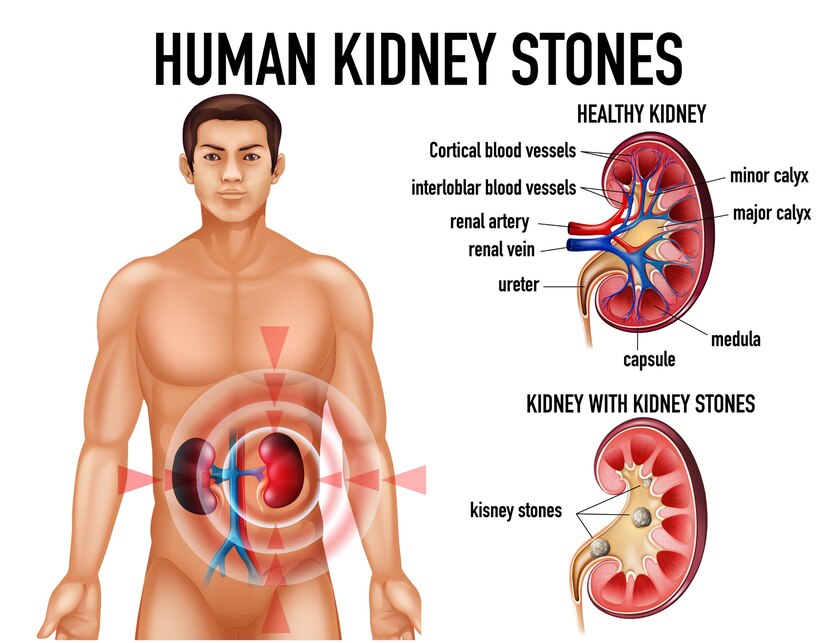Every living being’s survival depends on the successful functioning of various organs, and for us humans, kidneys are no exception. These organ’s critical role in our overall health is often underestimated. This article aims to shed light on the importance of kidneys, explaining their essential functions and providing tips on how to maintain their health.
Introduction to Kidneys
Human body houses two kidneys, both of which are bean-shaped and reddish-brown in color. Roughly the size of a clenched fist, these organs are located on either side of the spine, just below the ribcage. Each kidney weighs about 135 to 150 grams, and their indented side faces toward the spine.
The kidneys are powerful chemical factories that perform a variety of vital functions, the most crucial of which is filtering out waste products and excess fluid from the body. This process of filtration and reabsorption occurs about 60 times a day, meaning that these organs filter approximately 180 litres every 24 hours.
Structure of Kidneys
Each kidney is enveloped by three layers made up of fat or connective tissue, known as the renal capsule. These layers provide additional stability, protect the kidney from external injury, and anchor it to the surrounding tissue.
The kidney’s structure can be divided into two primary parts: the outer layer, known as the renal cortex, and the internal part, known as the renal medulla. The renal cortex is home to around 1.2 million renal corpuscles, which are the site of urine production. The renal medulla, on the other hand, houses blood vessels and winding renal tubules. Urine passes through these tubules, then through the renal pelvis to the ureter, and finally out of the body.
Task of the Kidneys
The kidneys are essentially our body’s sewage treatment plants. Their primary job is to filter out waste products and excess fluid from the bloodstream and excrete them as urine. As such, kidneys play a crucial role in maintaining the body’s fluid balance and regulating the composition of blood.
These organs also contribute to the production of specific hormones that affect the function of other organs. For instance, a hormone produced by the kidneys stimulates the production of red blood cells. Other hormones produced by the kidneys help regulate blood pressure and control the body’s calcium metabolism.
In addition, kidneys aid in maintaining the body’s acid-base balance. Thus, they ensure that the blood doesn’t become overly acidic or alkaline. Furthermore, kidneys also influence the body’s energy metabolism. When blood sugar levels are low, kidneys can produce sugar and release it into the bloodstream.
Kidney Health Matters: Early Detection is Vital
Maintaining well-functioning kidneys is essential to overall health. Early detection of kidney disease can be life-saving. Appropriate medication and lifestyle changes, along with early referral to a kidney specialist, can prevent or delay kidney failure.
Regular kidney health checks are especially crucial for those at an increased risk of chronic kidney disease. Individuals with high blood pressure or diabetes, those with a family history of kidney disease, or belonging to specific ethnic groups have a higher risk of developing kidney disease.
Signs of Poor Kidney Function
Kidney disease often doesn’t manifest any symptoms until it has progressed significantly. However, there are specific signs that may indicate a decline in kidney function. These include:
- High blood pressure.
- Presence of blood and/or protein in the urine.
- A creatinine and Blood Urea Nitrogen (BUN) blood test, outside the normal range.
- A glomerular filtration rate (GFR) less than 60.
- More frequent urination, particularly at night; difficult or painful urination.
- Puffiness around the eyes, swelling of hands and feet.
Common Kidney Issues
Common kidney issues include urinary tract infections and kidney stones. Long-term or recurrent urinary tract infections can lead to kidney damage over time. Kidney stones, on the other hand, can cause severe back and side pain when passing, and recurrent episodes can lead to kidney damage.
Kidney Disease and its Treatment
Many kidney diseases can be treated successfully. Careful control of diseases like diabetes and high blood pressure can help prevent kidney disease or keep it from getting worse. Unfortunately, the exact causes of some kidney diseases remain unknown, and specific treatments are not yet available for them.
If kidney disease progresses to kidney failure, treatment options include hemodialysis, peritoneal dialysis, or kidney transplantation. Hemodialysis and peritoneal dialysis involve the use of machines to perform the job of the kidneys, cleaning the blood of accumulated toxins. Kidney transplantation, on the other hand, involves replacing the failed kidneys with a healthy one from a living or deceased donor.
Maintaining Kidney Health
The best way to maintain kidney health is to lead a healthy lifestyle. This includes eating a balanced diet, staying well-hydrated, maintaining a healthy weight, and controlling blood sugar levels and blood pressure. Regular exercise and avoiding over-the-counter pain relievers can also help keep your kidneys healthy.
References
- Menche N. (ed.) Biologie Anatomie Physiologie. München: Urban & Fischer/ Elsevier; 2016.
- Pschyrembel W. Klinisches Wörterbuch. Berlin: De Gruyter; 2017.
- Schmidt R, Lang F, Heckmann M. Physiologie des Menschen: mit Pathophysiologie. Heidelberg: Springer; 2011.
- IQWiG health information is written with the aim of helping people understand the advantages and disadvantages of the main treatment options and health care services.


